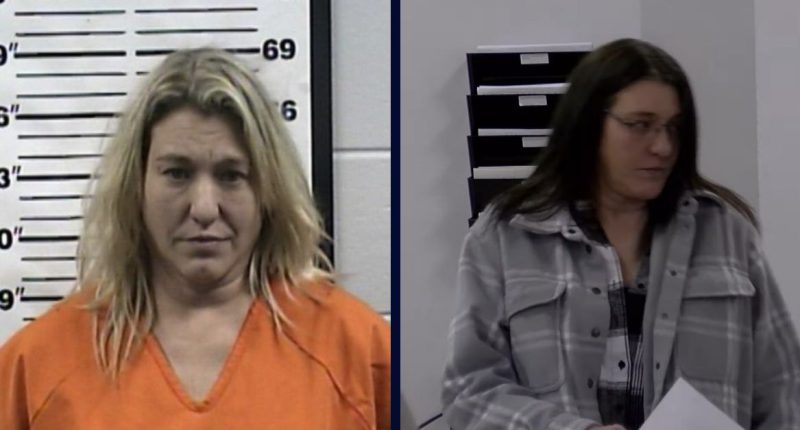Share this @internewscast.com
Left: Mary Jane Terry’s booking photo (Forest County Sheriff’s Office). Right: Mary Jane Terry in court on Jan. 6 (WJFW/YouTube).
A Wisconsin woman who admitted to dragging her husband under her truck for almost 50 feet, leading to his death, has been sentenced to ten years in prison.
Mary Terry, aged 50, entered a guilty plea on January 6 for committing homicide by driving a vehicle while intoxicated, linked to the death of her husband, Donald Britten Jr., on October 19, 2023. Terry was charged with deliberately hitting Britten with her truck while her blood-alcohol level was 0.298, over four times the legal limit. After backing into him, Terry dragged his body across 48 feet of pavement before running him over a second time. According to the criminal complaint, a neighbor recounted hearing a “prolonged thud” followed by sounds resembling a vehicle moving over a speed bump at the scene.
As reported previously by Law&Crime, Terry was originally charged with first-degree intentional homicide.
Love true crime? Sign up for our newsletter, The Law&Crime Docket, to get the latest real-life crime stories delivered right to your inbox.
Prosecutor Alexander Seifert demonstrated in court the distance Britten’s body was dragged by Terry’s truck, highlighting that the courtroom’s size fell just short of the actual 48-foot distance.
But Seifert stated in court that if anyone felt like 48 feet was not that long of a distance, “I would certainly encourage them to drag a finger across a cheese grater for one inch with their body weight — not the weight of a truck.”
Seifert reiterated the noise heard by a neighbor that sounded like a vehicle driving over a speed bump — “doo doo, doo doo.” He added, “In this case, obviously the bump was Mr. Britten.”
He also showed images in court of the injuries Britten sustained during the collision that killed him, graphically describing the gruesome “effect that concrete does to human flesh.” While the cameras in the courtroom were not permitted to capture those images, they turned instead to Terry, who sobbed at the defense table as she avoided looking at what she had pleaded guilty to.
Seifert stated that while Terry didn’t have a criminal history, her violent act against Britten still made her “a danger to the community” and recommended the maximum sentence — 15 years in prison plus 10 years probation.
When the defense team spoke, attorney Kelli Sue Thompson said Terry became an alcoholic over the course of many years and tragedies in her family, a condition that was only made worse by the death of her son in a car accident. While she said her client was not denying what happened when she backed over her husband, Thompson stated that Terry “loved him,” and both of them were “so intoxicated” on the night of Britten’s death. So intoxicated, Thompson said, that Terry “does not remember” what happened that fateful night.
Terry’s other defense attorney, Albert Moustakis, also argued that his client was so intoxicated that her crime could not have been intentional, and she should not be sentenced as if it was. He stated that Terry “takes complete responsibility” for her actions.
While Terry did not speak herself, Thompson read a statement written by Terry aloud in court. In the statement, she said, “I would have never intentionally hurt Donnie” and described him as the love of her life.
When it came to Judge Michael Schiek, he stated that “the evidence shows this was more than an accident.” Before handing down his sentence, he said, “What’s sticking with me today that I heard … is this would never have happened if you hadn’t been intoxicated,” addressing Terry directly. He added, “I think that’s probably true. But it did, and you were, and I can’t accept the intoxication as part of any type of defense.”
Considering mandatory minimums — five years under Wisconsin law — but feeling that the crime did not call for either the minimum or the maximum sentence, Schiek sentenced Terry to 10 years in prison plus 10 years of extended supervision. She was also ordered to pay restitution. The judge said Terry could not take part in a treatment program that would give her the chance to be released from prison before she completes eight years of her sentence.
















